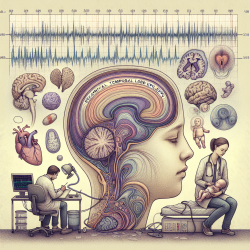As a speech-language pathologist (SLP), leveraging the latest research to enhance clinical practice is crucial for achieving optimal outcomes for children. A recent study titled Findings of a Multidisciplinary Assessment of Children Referred for Possible Neurodevelopmental Disorders: Insights from a Retrospective Chart Review Study provides valuable insights that can significantly impact your practice. This blog will highlight key findings from the study and suggest practical applications for SLPs.
Key Findings
The study reviewed 221 children referred for possible neurodevelopmental disorders (NDDs) and revealed the following:
- Autism Spectrum Disorder (ASD) was the most common diagnosis (64.3%), followed by ADHD (9.8%).
- High rates of comorbidity were observed, with 88.5% of children diagnosed with ADHD as a secondary condition.
- Significant deficits in language and communication skills were noted, with 79.2% of children unable to answer yes/no questions and 86.8% unable to understand "wh" questions.
- Sensory processing dysfunctions were prevalent, affecting daily activities and learning experiences.
Practical Applications for SLPs
Implementing the study's findings can enhance your clinical practice and improve outcomes for children with NDDs. Here are some practical steps:
1. Early Screening and Intervention
The study highlights the importance of early diagnosis and intervention. SLPs should advocate for early screening programs and collaborate with pediatricians, educators, and parents to identify children at risk as early as possible.
2. Comprehensive Assessments
Given the high rates of comorbidity and sensory processing issues, a multidisciplinary team (MDT) approach is essential. Collaborate with occupational therapists, psychologists, and other specialists to conduct comprehensive assessments that address all aspects of a child's development.
3. Personalized Intervention Plans
Use the detailed assessment data to create individualized intervention plans. Focus on the specific language and communication deficits identified, such as difficulties with yes/no questions and "wh" questions. Tailor your therapy to address these areas effectively.
4. Sensory Integration
Incorporate sensory integration techniques into your therapy sessions. Collaborate with occupational therapists to address sensory processing dysfunctions, which can significantly impact a child's ability to engage in therapy and daily activities.
5. Family Education and Support
Educate families about the importance of early intervention and provide them with strategies to support their child's development at home. Encourage parents to be active participants in the therapy process and provide them with resources to continue progress outside of sessions.
Encouraging Further Research
While the study provides valuable insights, further research is needed to explore the long-term outcomes of multidisciplinary assessments and interventions. SLPs can contribute to this research by documenting their clinical practices and outcomes, participating in research studies, and collaborating with academic institutions.
To read the original research paper, please follow this link: Findings of a Multidisciplinary Assessment of Children Referred for Possible Neurodevelopmental Disorders: Insights from a Retrospective Chart Review Study.










